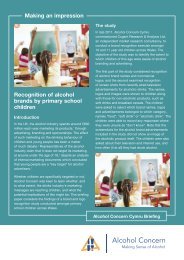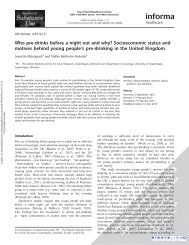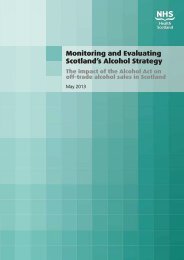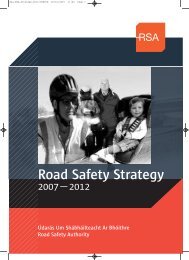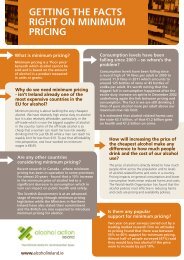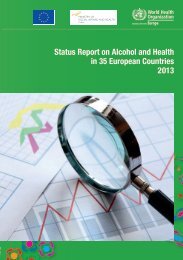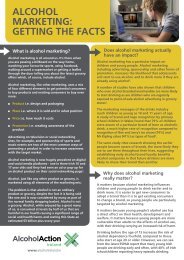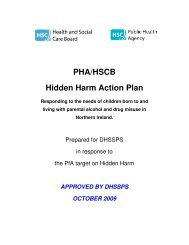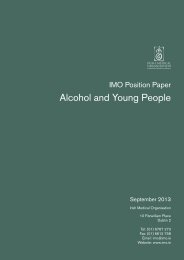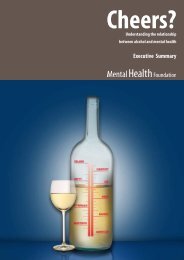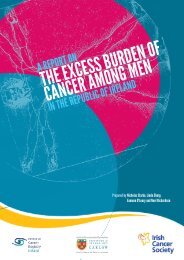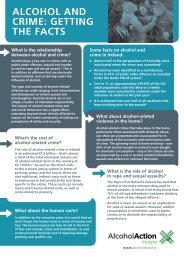Addressing the harmful use of alcohol - WHO Western Pacific Region
Addressing the harmful use of alcohol - WHO Western Pacific Region
Addressing the harmful use of alcohol - WHO Western Pacific Region
You also want an ePaper? Increase the reach of your titles
YUMPU automatically turns print PDFs into web optimized ePapers that Google loves.
4. Regulating availability<br />
Community participation and objections<br />
The trend in recent legislation is towards increasing public participation in different ways. The<br />
involvement <strong>of</strong> local communities in decisions on licensing and licence renewals can increase<br />
public satisfaction with <strong>alcohol</strong> control policies. The valuable watchdog role that neighbours<br />
and o<strong>the</strong>r members <strong>of</strong> <strong>the</strong> community play increases <strong>the</strong> effectiveness <strong>of</strong> regulators’ monitoring<br />
<strong>of</strong> licensing premises (Ayres and Braithwaite 1992).<br />
It is important for community participation in licensing decisions that <strong>the</strong> public is notified about<br />
applications for any new licence or renewal, both on <strong>the</strong> site and in <strong>the</strong> public notices section<br />
<strong>of</strong> <strong>the</strong> local newspaper. As a licence application <strong>of</strong>ten requires a prior planning consent, it may<br />
be important to also ensure public notification <strong>of</strong> planning applications for any new licensed<br />
premises in zones where <strong>the</strong> sale <strong>of</strong> <strong>alcohol</strong> is a discretionary activity, so that <strong>the</strong> public may<br />
participate in location decisions too.<br />
In British Columbia, Canada, <strong>the</strong> provincial licensing authority may not issue a licence unless <strong>the</strong><br />
local government and first nation have been notified and consulted. Their recommendations<br />
and advice must address <strong>the</strong> criteria in <strong>the</strong> Act and, in certain circumstances, <strong>the</strong>y may<br />
survey local residents. The licence cannot be issued if <strong>the</strong> local government or first nation<br />
recommend against it.<br />
New Zealand allows public objections to applications and renewals from individuals with<br />
an interest greater than <strong>the</strong> public in general (neighbours, elected councillors, community<br />
leaders). They may address <strong>the</strong> licence criteria set out in <strong>the</strong> legislation. There are currently<br />
proposals to include any available local government <strong>alcohol</strong> policy in <strong>the</strong> licensing criteria.<br />
These policies adopted by elected councils are based on a community consultation process.<br />
Recent New South Wales legislation includes a requirement for <strong>the</strong> licensee to submit a<br />
community impact statement with <strong>the</strong> application and for <strong>the</strong> licensing authority to consider<br />
<strong>the</strong> views <strong>of</strong> <strong>the</strong> local community and ensure that <strong>the</strong> overall social impact <strong>of</strong> its decisions is<br />
not “detrimental to <strong>the</strong> well-being <strong>of</strong> <strong>the</strong> local or broader community.” There is also a public<br />
complaints procedure. Victoria allows public objections to any licence grant, move or variation<br />
on grounds <strong>of</strong> detriment to <strong>the</strong> amenity <strong>of</strong> <strong>the</strong> area and specifically provides for objections<br />
by <strong>the</strong> local council. (Legislation <strong>of</strong>ten guards against objections from competing licensed<br />
businesses or any objections <strong>the</strong> licensing authority considers “vexatious.”)<br />
Return to TOC<br />
51



